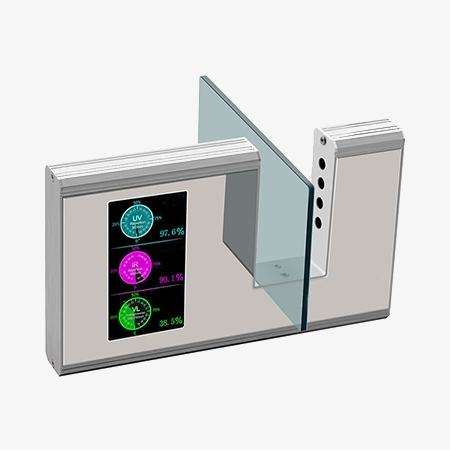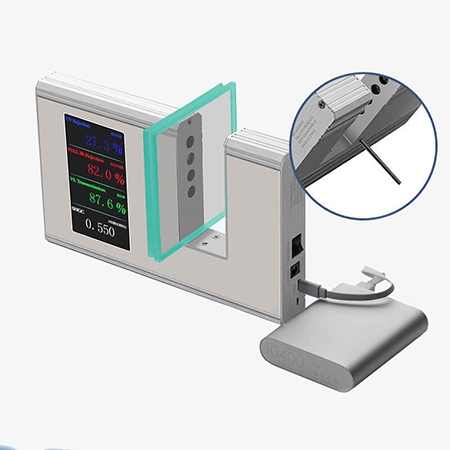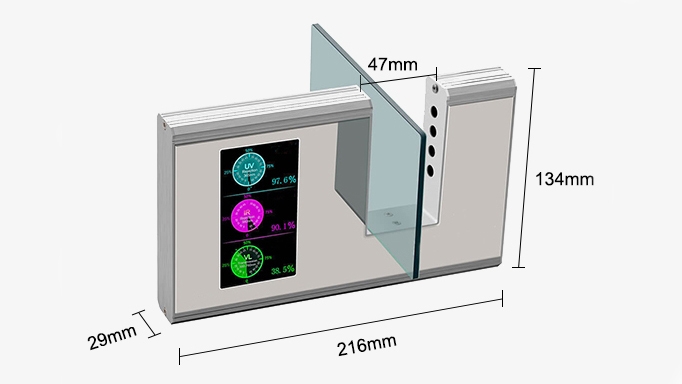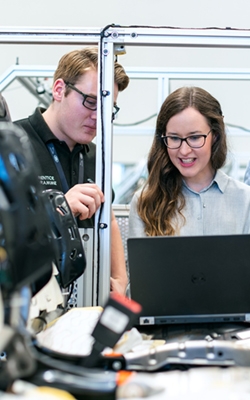The light transmission meter can measure 365nm UV rejection rate, 940nm/1400nm/full infrared rejection rates, visible light transmittance, TSER and SHGC total solar transmittance seven parameters. The solar film transmission meter has a real-time dynamic self-calibration function, which is automatically calibrated after power-on.

Extra large LCD screen with clear backlight
- The spectrum transmission meter features a large, easy-to-read LCD screen that provides clear and precise measurements.
- Equipped with bright backlighting for clear visibility even in low-light environments, ensuring easy use in various lighting conditions.
- The clear display allows for quick data interpretation, making it ideal for both indoor and outdoor use, especially for professionals working in varied lighting.

Designed with support feet for easy reading
- The built-in support legs ensure the meter remains stable during use, preventing any movement that could affect the accuracy of measurements.
- With the support legs, the meter is positioned at an optimal viewing angle, allowing for a comfortable and clear reading of the display.
- The sturdy design of the support legs provides additional stability, ensuring reliable performance in both indoor and outdoor environments, even in varying lighting conditions.
Dimension

Applications
SISCO tint meter is used to measure the visible light transmission (VLT) of glass or window films, ensuring compliance with regulations and assessing performance. It is widely applied in the automotive industry for verifying car window tinting, law enforcement for roadside inspections, construction to evaluate building window films, industrial quality control for testing optical materials, and the solar energy industry to assess the effectiveness of tinted or coated glass panels in blocking UV and infrared radiation while optimizing visible light transmission. Its portability and precision make it an essential tool across various sectors.

Construction

Industrial Quality Control

Solar Energy Industry

Automotive Industry
| Model | SISCO-TM-182 |
| UV Peak Wavelength | 365nm |
| IR Peak Wavelength | 940nm, 1400nm, Full IR, TSER and SHGC |
| Visible Light | 380-760nm (conform to CIE photopic luminosity function) |
| Resolution | 0.1% |
| Measurement Accuracy | ±2% (colorless and uniform transparent material) |
| Test Card Slot | 47mm*91mm (W*H) |
| Power Supply | 5V DC/1A (Type-C) |
| Dimension | 216mm*134mm*29mm (L*H*W) |
| Weight | 590g |
Q1: What is a tint meter?
A1: A tint meter is a device used to measure the Visible Light Transmission (VLT) of glass or window films. It determines the percentage of light that passes through a window, helping to assess whether the tint meets legal or industry standards. Tint meters are commonly used in the automotive industry to ensure compliance with regulations on window tinting, in law enforcement for roadside checks, in construction for evaluating window films, and in industrial quality control for testing tinted materials. These devices are portable, easy to use, and provide precise readings for various applications.
Q2: Can I use a tint meter on all types of glass?
A2: Yes, a Tint Meter can generally be used on most types of glass, including:
- Automotive windows: To measure the tint level of car windows.
- Architectural glass: To assess tinted or coated glass used in buildings.
- Glass with films or coatings: Tint meters can measure the combined transparency of the glass and any applied films, such as UV or reflective coatings.
However, for accurate readings, the glass surface should be clean and free from obstructions, and the meter should be properly calibrated. Some specialized tint meters can also work with laminated or double-glazed windows, but it's essential to check the device’s specifications for compatibility with specific glass types.
Q3: Are tint meters legal to own?
A3: Yes, tint meters are legal to own in most countries. They are commonly used by professionals, law enforcement, and businesses to measure Visible Light Transmission (VLT) of glass and window films. While owning a tint meter is generally legal, its use may be regulated based on local laws, especially for checking compliance with window tinting regulations. Always check local laws to ensure proper use.
Tips: Can the spectrum transmission meter measure multiple light spectrums?
Yes, many Spectrum Transmission Meters are equipped to measure multiple light spectrums, making them versatile tools for a wide range of applications. These meters can assess Visible Light Transmission (VLT) to determine how much visible light passes through a material, which is crucial for clarity and compliance with tinting regulations. They also measure Ultraviolet (UV) Rejection, which indicates the material’s ability to block harmful UV rays that can cause skin damage and fade interiors. Additionally, they evaluate Infrared (IR) Rejection, which reflects the material’s capacity to reduce heat transfer and improve energy efficiency. Advanced models are capable of simultaneously analyzing all these spectrums, providing a complete picture of a material's optical and thermal performance. This makes them indispensable in industries like automotive, construction, and solar energy, where precision and comprehensive data are essential.
Thank you for buying industrial test and measurement equipment on SISCO.com, all products sold by SISCO and the partner cover a 12 months warranty, effective from the date of receiving the products.
What is covered?
SISCO is responsible for providing free spare parts, and free technical support to assist the customer to repair the defective products until the problem is solved.
What is not covered?
- Product purchased from anyone other than a SISCO store or a SISCO authorized reseller.
- Expendable parts.
- Routine cleaning or normal cosmetic and mechanical wear.
- Damage from misuse, abuse or neglect.
- Damage from use of parts other than SISCO approved.
- Damage from use outside the product’s usage or storage parameters.
- Damage from use of parts not sold by SISCO.
- Damage from modification or incorporation into other products.
- Damage from repair or replacement of warranted parts by a service provider other than a SISCO authorized service provider.
- Damage caused by the application environment not meeting the product usage requirements and the failure to perform preventive maintenance.

